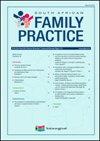Specialties preference by gender among medical students at Sefako Makgatho Health Sciences University, South Africa
IF 1.2
Q2 MEDICINE, GENERAL & INTERNAL
引用次数: 0
Abstract
Background: To determine the speciality preferences and the gender differences in the choice of speciality among medical students at Sefako Makgatho Health Sciences University, South Africa.Methods: This cross-sectional study was conducted among fourth- to sixth-year medical students. A structured self-administered questionnaire was used to collect the data. Data analysis was performed using STATA version 16 (StataCorp, College Station, TX, United States).Results: A total of 174 students participated (response rate of 74%). Their median age was 23 years with interquartile range of 2 years. More than half (57%) were females. About 83% had no previous qualifications. Most (89%) have shown interest in pursuing specialist training. Surgery, obstetrics and gynaecology and internal medicine were the most selected specialities, while family medicine, ophthalmology, forensic medicine, public health medicine, ear, nose and throat, and accident and emergency medicine were the least preferred. Males were more likely interested in surgery and internal medicine, while females preferred obstetrics and gynaecology.Conclusion: The majority of the medical students intends to pursue their postgraduate medical training. Even though the results were not statistically significant, there are gender differences in speciality preferences. There is a need to develop and implement career guidance and recruitment plans to deal with specialities with poor recruitment and gender imbalance.Contribution: To deal with specialties with poor and gender imbalance, career guidance and recruitment plans must be developed and implemented.南非 Sefako Makgatho 健康科学大学医学生的性别专业偏好
背景目的:确定南非 Sefako Makgatho 健康科学大学医科学生在选择专业时的专业偏好和性别差异:这项横断面研究的对象是四年级至六年级的医科学生。采用结构化自填问卷收集数据。数据分析采用 STATA 16 版本(StataCorp,College Station,Texas,United States):共有 174 名学生参与了调查(回复率为 74%)。他们的年龄中位数为 23 岁,四分位距为 2 岁。一半以上(57%)为女性。约 83% 的学生没有任何学历。大多数人(89%)表示有兴趣接受专科培训。外科、妇产科和内科是选择最多的专科,而家庭医学、眼科、法医学、公共卫生医学、耳鼻喉科和急诊科则是选择最少的专科。男性对外科和内科更感兴趣,而女性则更喜欢妇产科:结论:大多数医科学生打算继续接受医学研究生培训。尽管结果在统计学上并不显著,但在专业偏好上存在性别差异。有必要制定并实施职业指导和招聘计划,以应对招聘不力和性别失衡的专业:贡献:为应对招聘不力和性别失衡的专业,必须制定和实施职业指导和招聘计划。
本文章由计算机程序翻译,如有差异,请以英文原文为准。
求助全文
约1分钟内获得全文
求助全文
来源期刊

South African Family Practice
MEDICINE, GENERAL & INTERNAL-
CiteScore
1.50
自引率
20.00%
发文量
79
审稿时长
25 weeks
期刊介绍:
South African Family Practice (SAFP) is a peer-reviewed scientific journal, which strives to provide primary care physicians and researchers with a broad range of scholarly work in the disciplines of Family Medicine, Primary Health Care, Rural Medicine, District Health and other related fields. SAFP publishes original research, clinical reviews, and pertinent commentary that advance the knowledge base of these disciplines. The content of SAFP is designed to reflect and support further development of the broad basis of these disciplines through original research and critical review of evidence in important clinical areas; as well as to provide practitioners with continuing professional development material.
 求助内容:
求助内容: 应助结果提醒方式:
应助结果提醒方式:


